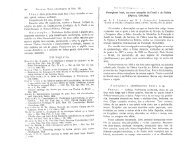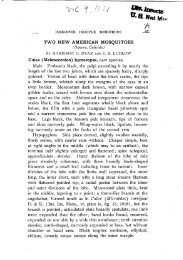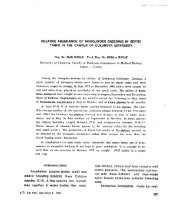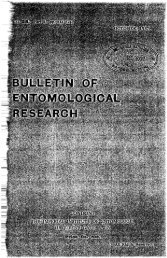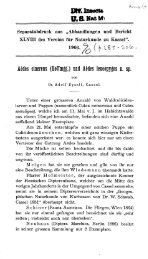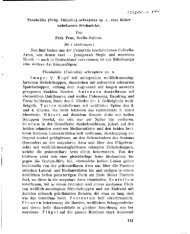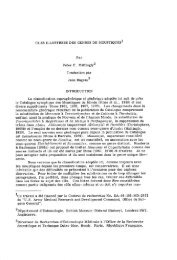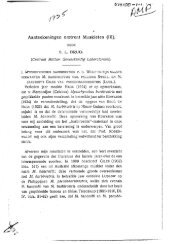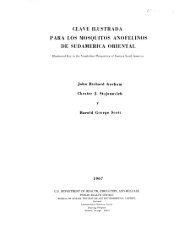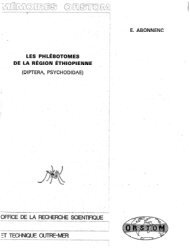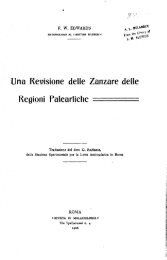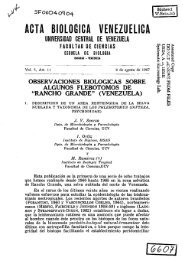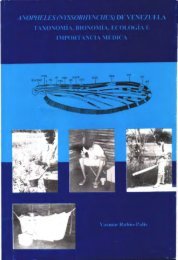a handbook of the mosquitoes of north america - Systematic Catalog ...
a handbook of the mosquitoes of north america - Systematic Catalog ...
a handbook of the mosquitoes of north america - Systematic Catalog ...
Create successful ePaper yourself
Turn your PDF publications into a flip-book with our unique Google optimized e-Paper software.
BIOLOGY 39<br />
which <strong>the</strong>re is an extensive growth <strong>of</strong> aquatic vegetation. In<br />
New Jersey, it has been found breeding in cranberry bogs.<br />
Ano<strong>the</strong>r interesting mosquito, W3~0~~z~ia s~&hii, breeds<br />
only in <strong>the</strong> water contained within <strong>the</strong> leaves <strong>of</strong> <strong>the</strong> pitcher<br />
plant (Sarraceka pwpurea). The eggs are laid usually in <strong>the</strong><br />
younger leaves above <strong>the</strong> water line. When water reaches<br />
<strong>the</strong>m, <strong>the</strong>y hatch and develop to maturity. The species oc-<br />
curs only where its hos,t plant is found.<br />
HABITS OF THE ADULTS<br />
Food-habits<br />
Mosquitoes have gained <strong>the</strong>ir notoriety through <strong>the</strong>ir blood<br />
sucking habits and, more recently, by <strong>the</strong> discovery that <strong>the</strong>y<br />
are <strong>the</strong> vectors <strong>of</strong> serious diseases <strong>of</strong> man. Not all <strong>mosquitoes</strong><br />
suck blood; some do not take blood <strong>of</strong> any kind, while o<strong>the</strong>rs<br />
restrict <strong>the</strong>mselves to non-mammalian blood, attacking birds,<br />
amphibia, and o<strong>the</strong>r hosts. The males are not known to ob-<br />
tain blood and <strong>the</strong>ir mouth-parts are so modified that <strong>the</strong>y are<br />
not adapted for piercing. They feed principally on <strong>the</strong> nec-<br />
tar and juices <strong>of</strong> plants. O<strong>the</strong>r species, though attacking mam-<br />
mals, do not readily attack man. Our knowledge <strong>of</strong> <strong>the</strong> food<br />
<strong>of</strong> <strong>the</strong> adults is not very accurate or complete. The domesti-<br />
cated species usually take human blood with avidity. Here<br />
belong Cztlex $pielzs, C&ex qwinquef ascka tus and Aedes aegy-<br />
pti. Culex territam may also be included though it may be<br />
said to be only partly semi-domesticated. Most <strong>of</strong> our anophe-<br />
lines readily attack man though some <strong>of</strong> <strong>the</strong>m are said to pre-<br />
fer o<strong>the</strong>r mammalian blood. There appears to be consider-<br />
able evidence that <strong>the</strong> presence <strong>of</strong> <strong>the</strong> larger domestic animals<br />
as horses, cows, dogs and pigs near human abodes may reduce<br />
<strong>the</strong>ir attacks on man. Most <strong>of</strong> <strong>the</strong> Aedine <strong>mosquitoes</strong> attack<br />
man with <strong>the</strong> greatest avidity and lurid tales <strong>of</strong> <strong>the</strong>ir blood-<br />
thirstiness can be found in <strong>the</strong> accounts <strong>of</strong> arctic explorers,<br />
hunters, trappers, and o<strong>the</strong>rs who travel in our nor<strong>the</strong>rn wood-<br />
lands. The attacks <strong>of</strong> Aedes stiwmlalzs, A. excrucians, A.



